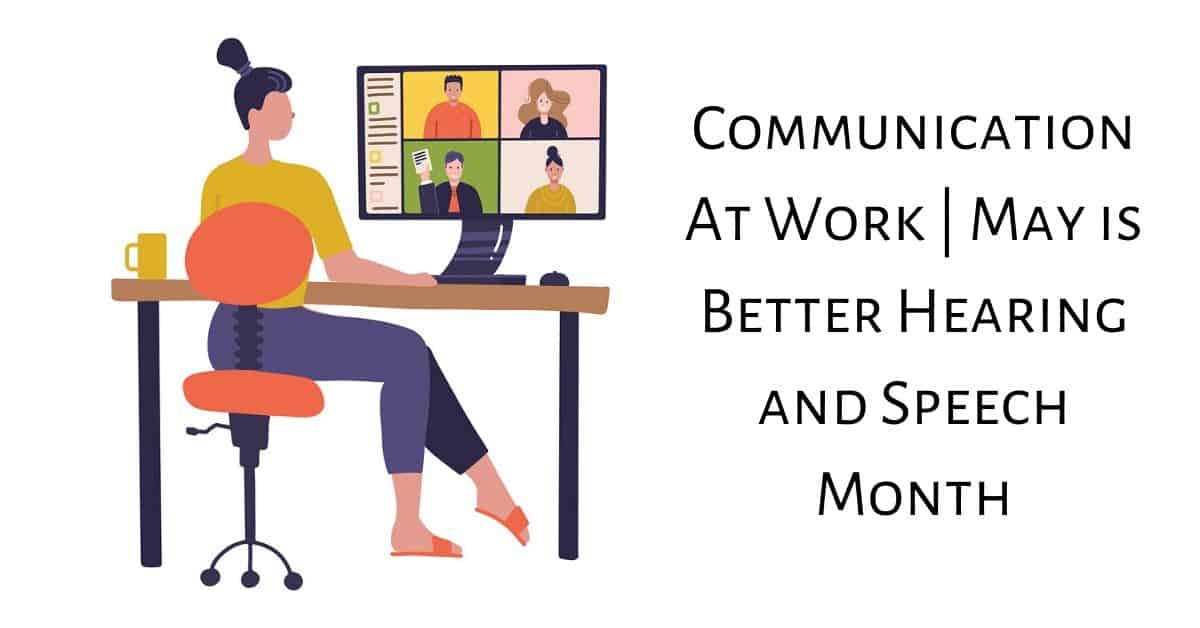In many parts of the United States, the month of May brings flowers, milder weather, and a return of wildlife for us to enjoy. Not only does the progression of spring delight our senses, but May is also a month designated to celebrate Better Hearing and Speech Month! The American Speech-Language-Hearing Association has set aside the month to consider a topic each year related to hearing and communication. This year’s theme is “Communication at Work,” indeed a topic of interest to anyone of working age and beyond. In keeping with this year’s theme, let’s consider the ways that hearing is essential to workplace communication, some possible issues that may arise, and the ways you can accommodate people with hearing loss in the workplace.
Hearing and Workplace Communication
Although there are two main types of communication—textual and verbal—workplaces tend to require both types of communication for most tasks. Not only offices and professional occupations require memos, emails, and online chats, but all places of work have a dimension of textual communication. However, verbal communication is truly ever-present in our workplaces. As the past weeks have demonstrated, we need to talk to one another to be able to work efficiently. How many times have you received an email and let it fall to the bottom of your inbox without the needed attention? Verbal communication is an essential feature of most workplace communication, even when it is used to augment lengthier textual communication. Although workplaces must take steps to accommodate hearing impaired and deaf employees, speech and hearing tend to be the baseline of workplace conversations.
Hearing Loss and Workplace Communication
When a person has known hearing impairment or deafness, employers can properly accommodate their communication needs. However, too many people have undiagnosed and untreated hearing loss in the workplace, making it impossible to properly accommodate their needs. In some instances, what might seem like miscommunication or crossed wires could have hearing loss hiding in the background. Did you feel like you had come to an agreement about the right approach to a project or problem in a casual conversation? If it becomes clear after the fact that you were not on the same page, then you might find out that hearing loss was beneath the surface of the miscommunication. Calling out simple statements across a room is common in some workplaces, and formal meetings can also make it difficult to hear for some employees.
Accommodating Hearing Loss in the Workplace
Some simple steps can make it easier to communicate with a person who has hearing loss in your workplace, even if that hearing loss is untreated. Perhaps the most beneficial thing you can do is to stand close to the person with your face in view. Many people with hearing loss consciously or unconsciously use facial cues and lip reading to put together some of the missing pieces of information in a conversation. Another effective way to fill the gaps in conversations is to send a follow-up message in textual form with crucial information. If you can easily add your information to an email, text message, memo, or online chat, then you can help your coworker with hearing loss to get the essential information. Although you can take steps to accommodate those with untreated hearing loss in your workplace, be careful not to talk down to that person or to overemphasize your speech. Going too far with speaking loudly, clearly, or slowly can have the effect of making it seem like you are condescending to the person you suspect has hearing loss. These steps can go a long way to assisting a person with untreated hearing loss in the workplace, but the best solution is to seek treatment. If you are the person who suspects you might have hearing loss, don’t delay scheduling a hearing test.
Our team can determine your hearing ability, and if needed, we can recommend the right hearing aids to suit your lifestyle and individualized hearing profile. Our team will help you incorporate that hearing treatment into your working and leisure life. Putting off treatment for your hearing loss can have an effect not only on your personal and family life but also your ability to productively contribute to your workplace.

